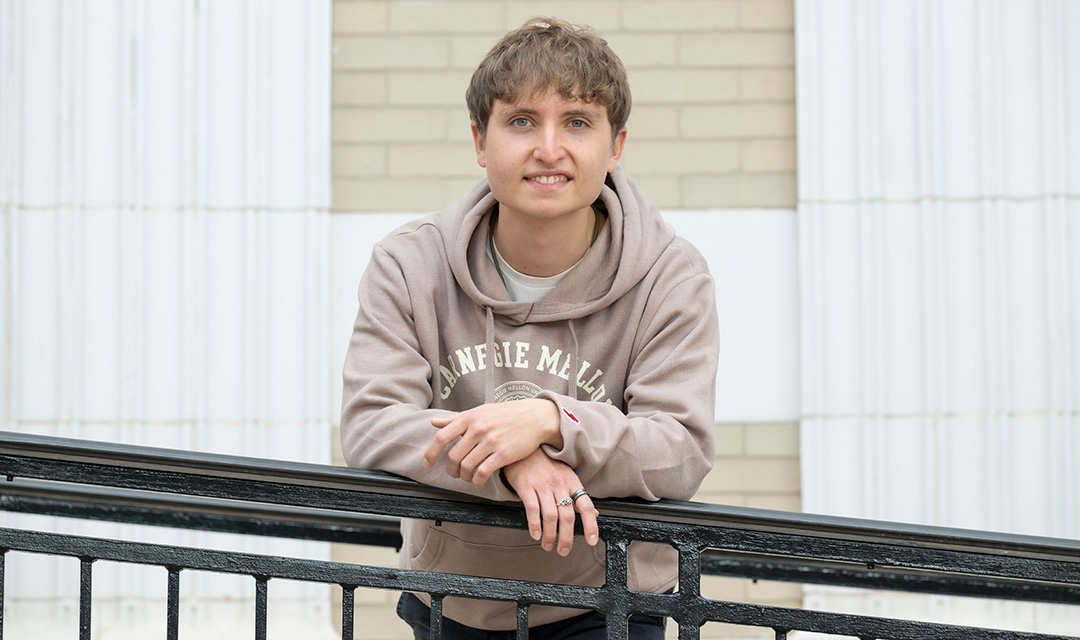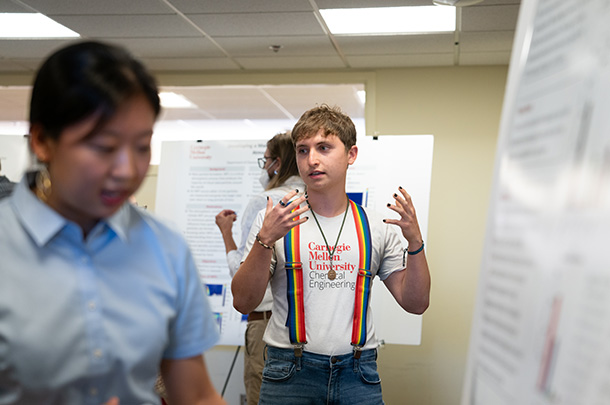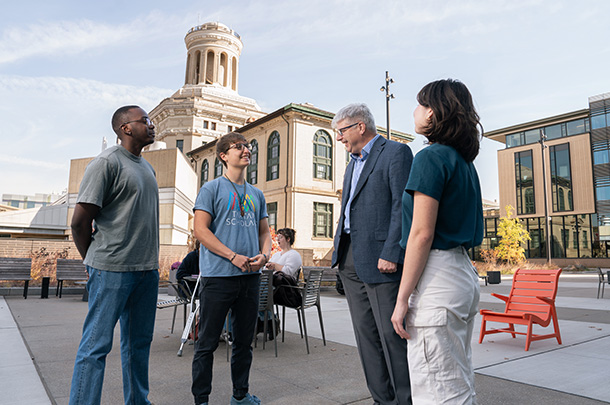Student, scholar, teacher, researcher
Lauren Smith
Feb 14, 2025

Source: Carnegie Mellon University
Like many seniors, Gabe Mendez-Sanders felt a mix of emotions as he prepared to graduate with a bachelor's degree in chemical engineering and looked at paths forward from Carnegie Mellon. The undercurrent pulling him to stay, however, was particularly strong.
"I had this resonating feeling that there was more that I wanted to give to Carnegie Mellon, and there was more that I wanted to learn from the school before leaving," he says.
He has found those opportunities as a Fifth Year Scholar. Through the CMU program, select undergraduate students broaden their educational experience with an additional year on campus while giving back to the CMU community.
Mendez-Sanders has focused his fifth year on engineering education. The keystone is a mixed methods study he is leading in Joanne Beckwith Maddock's Introduction to Chemical Engineering courses.
Beckwith Maddock, an assistant teaching professor, has been redesigning the course curriculum to help first-year students more clearly see the through line from what they're learning to how they can apply it in research and careers. She and Mendez-Sanders developed an intervention called People-Oriented Recitation Problems. The intervention frames the technical recitation content in faculty research and the societal implications of that research. "Instead of jumping into a mass balance or into unit analyses, we first introduce a faculty member and their research area. We show the students how what they're about to learn connects to the research," says Mendez-Sanders.

At the national level, enrollment and retention in chemical engineering departments have been declining. Beckwith Maddock and Mendez-Sanders are studying whether their intervention increases their students' interest in chemical engineering, gives students a clearer sense of the major, and makes them more likely to declare the major. To evaluate the intervention, Mendez-Sanders is administering a pre- and post-semester survey that he developed using Social Cognitive Career Theory. He is also conducting focus groups.
When he presented the research at the 2024 American Institute of Chemical Engineers (AIChE) Annual Student Conference, Mendez-Sanders won first place in the Education and General Papers section of the undergraduate research poster competition. In June, he will present a paper at the American Society for Engineering Education (ASEE) Conference.
Mendez-Sanders says that the statistics courses he is taking this year are aiding his development into educational social science research. Fifth Year Scholars are supported by free CMU tuition and a fellowship. He's also enjoying the flexibility to participate in workshops and other learning experiences, like those offered by the CMU Eberly Center for Teaching Excellence and Educational Innovation.

Mendez-Sanders is surprised by how much his network is expanding this year. He's been invited to several universities around the country to learn about their engineering education research. He has also deepened his relationships with CMU faculty.
As a course assistant for Chemical Reaction Engineering, Mendez-Sanders is working closely with Coty Jen to develop a project in which students will model the water reuse systems used by the Center for Sustainable Landscapes at Phipps Conservatory.
His interest in teaching began early. In high school, he created a program to teach elementary students how to solve a Rubik's Cube. As an undergraduate, Mendez-Sanders was a peer tutor with the Student Academic Success Center. He's now in a leadership role, advising other peer tutors.
The Fifth Year Scholar program encompasses a community impact project, and Mendez-Sanders created a Student College (StuCo) course on peer mental health support that he is co-teaching.
All of his fifth year experiences are preparing him for a career in engineering education research. He has been awarded a GEM Fellowship for his graduate studies and plans to attend Cornell University.
"Part of why I wanted to do the Fifth Year Scholar program was that I wasn't certain what I wanted to do next," says Mendez-Sanders. He felt inertia carrying him toward the traditional technical route, yet he wanted more opportunities to examine the societal impacts of engineering and education.
As a Fifth Year Scholar, Mendez-Sanders has gained confidence that his next step is a technical Ph.D. in chemical engineering, with research focused on engineering education. "I like this combination because it lets me develop my interests in the social sciences while retaining the technical competence to do some really cool work," he says.
